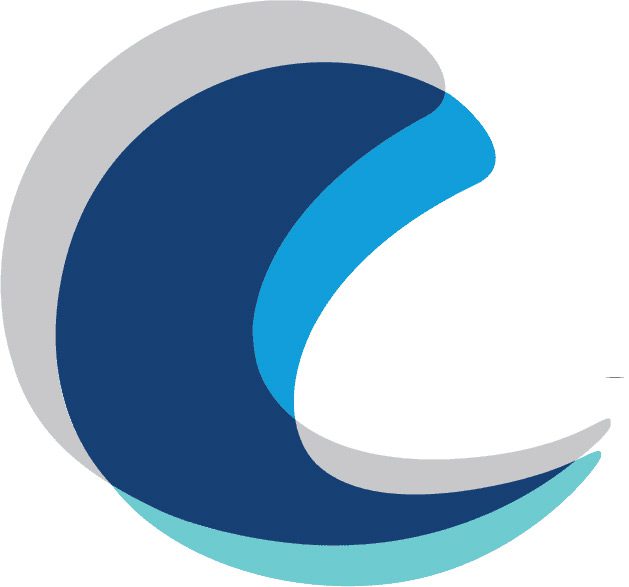
Institute News
This industry leading course provides direct access to professional membership of ICorr, for those with relevant experience. Corrosion management, failures and remediation commonly occur throughout all branches of engineering where metals are part of the structure or process. FOCE is a corrosion course that covers the basic principles of corrosion that are needed by engineers to understand why and how failures occur, actions that can be taken to manage the ongoing corrosion and/or remediate the structure, and options to prevent further corrosion, where possible. The course is presented as a series of modules, starting with essential background information about the corrosion process and then applying the basic principles to common engineering metals, including stainless steel, aluminium, and copper alloys.
Both the general and the different types of localised corrosion such as crevices, pitting, bi-metallic corrosion, etc., is considered. Common atmospheric and immersed conditions, re-bar in concrete, high-temperature atmospheres, water treatment, buried pipes, etc are considered to understand corrosion.
Corrosion management strategies, including material selection, cathodic protection, surface preparation, coatings, chemical treatments, inhibitors, etc., are included in the course.
The role of the corrosion engineer is described and includes investigation of failed components, inspection, and testing of samples, with practical examples and case histories included in the course notes.
As a classroom-based course, FOCE is provided in English by an experienced, practicing corrosion consultant. A copy of the training material is provided to each attendee. Questions and active participation are encouraged throughout the course, as many participants enjoy learning about the additional real-life examples that are provided by fellow attendees. Fun quizzes are held each morning so both the candidates and the tutor can assess their progress during the week on an ongoing basis. One-on-one sessions can be arranged where a student has a specific module requirement.
The learning modules are given over four intensive days, and candidates for the examination on the final day are encouraged to revise the material each evening to ensure that they understand the course content.
At the end of the course, all attendees are given a Certificate of Attendance, which shows that they have been present for all
the modules.
After passing the examination, participants receive a
Certificate of Achievement, which demonstrates that they
have received sufficient corrosion training to apply directly for a Professional grade of Membership of ICorr, such as TICorr or MICorr, depending on the other requirements of
the membership grade.
Previous attendees of the course have ranged from complete beginners in corrosion (zero previous knowledge) to practicing Corrosion Consultants and some of the comments received from participants are given below.
Please note that FOCE specifically geared for professional membership is not a Cathodic Protection or Protective Coatings Inspector type course and does not provide these qualifications. Those courses are available separately through ICorr’s specialist training providers and further details are available on the
ICorr website.
ICorr also offers many other specialist courses in Microbial Corrosion, Oil and Gas related corrosion topics, intumescent coatings, etc. Details of all ICorr courses are available on the Institute website.
The next FOCE course will be held at Corrosion House in Northampton 15-19th April 2024.
FOCE course cost is currently £1650 + VAT and includes a copy of the course notes, lunch each day plus tea and coffee.
The course fee must be paid in full before the delegate can attend the course. Potential delegates can fill in the application form on the website and contact ICorr for making payments.
Additional dates in 2024 will be posted in Corrosion Management magazine and on the ICorr website:
https://www.icorr.org/fundamentals-of-corrosion-for-engineers/
Recent feedback from delegates
- Great course, which I will certainly recommend to others.
-
The (redacted) project and myself have definitely gained as a result. With the knowledge gained I have been identifying issues on site and poor practices that are now being addressed. As a result Line Managers have sent me to undertake checks of the Civil Engineering works in areas I do not normally inspect.
-
I really enjoyed the course – you have a great teaching style, very clear and logical, it made the material easy to follow.
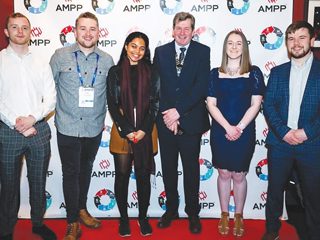
Institute News
The Fifth of the Series of YEP AMPP Journals, by Praveena Nanthakumaran, Now a Project Engineer at Alfanar.
AMPP Diary
As a previous Mechanical Engineering Graduate at Worley, I participated in ICorr’s Young Engineers Programme (YEP) 2020, which was sponsored by bp. The YEP 2020 case study was on the failure of titanium piping in an onshore desalination glycol plant, and I was part of the winning team. I celebrated alongside ICorr’s YEP 2022 winners at AMPP’s (Association for Materials Protection and Performance) 2023 Conference and EXPO in Denver, Colorado.
YEP 2020
ICorr’s year-long programme was targeted at young engineers with an interest in the Corrosion industry.
The programme consisted of a series of monthly evening lectures presented by corrosion subject matter experts. Midway through the year, the cohort was divided into teams to work on a real-life case study.
Before the covid pandemic, we had the opportunity to network with like-minded-engineers and researchers in the programme, and also connect with the more senior engineers and mentors. However, in 2020, covid-19 hit, and we moved to virtual sessions. We had to adapt to 100% remote learning and presenting in March 2020. Although these changes were initially perceived as challenges, they soon became the norm. The lectures covered a variety of topics, including but not limited to: Principles of corrosion, Fire protection, Corrosion under insulation, Welding and Non-Destructive Testing (NDT), Cathodic protection, Integrity management, and Fitness for service.
Our case study was on the failure of Titanium piping in an onshore desalination glycol plant. I was part of a team that included four other types of engineers: a welding specialist, two corrosion engineers, and a civil engineer). Our team mentor was Tasos Kostrivas (McDermott International).
Equipped with the knowledge from our lectures, a dedicated mentor, diverse strengths within the team, and our own eagerness for independent study, we began working on our case study. We were
given a process diagram, background information about the facility, activities taking place within it, leakage photographs and where they occurred in the facility process. Outside of our monthly evening
lectures, our group met virtually over MS Teams to piece together the information and find the cause of the failures as well as solutions to this real-life problem.
Summarising Our Findings
The primary material of construction in the plant was Titanium Grade 12. The plant saw in Mono Ethylene Glycol (MEG) that was returning onshore with containments, most of which were salts. These salts were removed within the facility via vacuum distillation and recycled. It was possible that under normal operations within the plant, there were organic acids present. Our overall findings were that initial plant environmental factors lead to the degradation of the incoming MEG.
Contributing environmental conditions were:
- Oxygen ingress via a plant equipment in the process,
- High temperatures of the process, and
- Presence of chlorides.
MEG degradation resulted in a mixture of acids (oxalic acid, acetic acid, and formic acid). Within the plant process, these organic acids lowered the pH. The presence of deposited metals and low pH led to metal dissolution and embrittlement.
We concluded that brittle fracture occurred due to:
- Hydrogen absorption,
- The sensitive location at the weld, and
-
The Ti microstructure that was susceptible to cracking. Our Ti microstructure had beta phases, which are known as easy paths for hydrogen transport because they have a relatively loosely packed structure and thus high diffusivity and solubility of hydrogen compared to the alpha phases of Ti Grade 12.
After identifying the mechanisms of corrosion, our team developed a risk assessment that evaluated the hazards, the consequences, and probability of each hazard item. We assigned each item a risk level and assessed whether the risks were acceptable. We then developed mitigating options via the principles of Eliminate Reduce Isolate Control (ERIC). Our final mitigation methods were to minimise oxygen ingress, carry out effective inspections, plan emergency repairs, and implement a robust long-term plan. For emergency repairs, alternative material options such as carbon steel were considered. For long-term plans, Ti was still the preferred material. Ti Grade 7 or Grade 11 were better options than Ti Grade 12 because they are pure alpha grades, have excellent weldability and fabricability, strength, and are the most corrosion-resistant Ti alloys.
AMPP 2023
I joined the winners of YEP 2022 at this year’s AMPP 2023 conference and EXPO, which has been the best experience of my engineering career to date. I was extremely grateful for this opportunity. The enormous size of the organisation and the breath of topics covered by AMPP were a reminder of the importance of the event. It was a very well-organised event. I enjoyed the week of Continuous Professional Development (CPD) and networking. Some of the highlights of AMPP for me included the inspector workstations, speaking with students at the poster competition, learning about hydrogen sulphide (H2S), enrolling in the AMPP leadership programme, and, of course, the awards ceremony!
Coatings Inspection Instruments Workshop
This workshop was designed for members who wanted to learn about the basics of instruments and pursue an AMPP Coating Inspector Certification, which has three certification levels, starting with CIP Level 1 as a Basic Coatings Inspector and ending with CIP Level 3 as a Senior Certified Coatings Inspector. The workshop was delivered by Bill Corbett and Lake Barrett from KTA-Tator Inc. They introduced us to various measuring tools, gauges, and visual SSPC Surface Cleanliness Standards (VIS 1 and 3) and how to use them in coating inspection on the shop floor or out in the field. The drop-in workshop had workstations where participants could use the various coating inspection tools or guides to assess samples, such as assessing the quality of abrasive blast blowing and the use of depth micrometres vs. replica tapes. It was a great hands-on session, and even though I am not a Coating Inspector expert, the stations gave me an appreciation for the work that our fellow Coating Inspectors do, the tools that they use to assess equipment, and what they are looking out for when called out.
H2S, H2S Management and the Benefits of Acrolein Over Other H2S Scavengers
Through a series of lectures, I learned about H2S,H2S management,
the benefits of acrolein over triazines, and THPs in controlling H2S.
H2S
H2S is a highly corrosive colourless gas that presents problems associated with personal safety, increased corrosion damage (e.g.,
in pipelines, which can experience hydrogen sulphide stress cracking, hydrogen embrittlement, and pitting corrosion), emissions to the environment, and exposure to people. There are also threshold limits in place on the amount of H2S that a hydrocarbon product can contain before it is sold. If they are off-spec, there can be large OPEX costs. To manage all these different issues, H2S management needs to be in place.
Importance of H2S Management
H2S management in the Oil and Gas (O&G) industry refers to the strategies, practices, and technologies used to monitor, control, and minimise the presence and effects of H2S in hydrocarbon streams.
| Issues |
Impacting |
| Environmental and Safety – H2S emission / exposure |
OPEX, Liability |
| Fines for off-spec oil and gas |
OPEX |
| Gas sweetening
equipment, towers |
CAPEX |
| Metallurgical upgrade
for sour services |
CAPEX |
| Under deposit and localised corrosion, plugged due
to iron sulphide
|
Integrity management,
flow assurance |
| Disposal of spent tower sweetening chemicals |
OPEX |
| Leadership |
Employees |
| Monitor H2S levels
throughout the facility and address any issues |
Pay attention for signs of H2S |
| Establish a process for responding to an H2S
exposure event |
Notify management of any unusual smells or issues with workplace ventilations |
| Provide H2S
training and PPE |
Compete H2S training
and wear the provided PPE |
| Identity hazards that could
lead to an acclimation of H2S |
Follow safety procedures
at all times |
Both workers and leaders have a responsibility to prevent H2S-related incidents wherever possible. Below are just some actions I learned we can take:
Benefits of Acrolein Over Other H2S Scavengers
A Hydrogen Sulphide (H2S) scavenger is a specialised chemical or fuel additive widely used in hydrocarbon and chemical processing facilities. These injected chemicals react selectively with and remove H2S to help meet product and process specifications.
Products treated for H2S include crude oil, fuels, and other refined petroleum products in storage tanks, tanker ships, rail-cars and pipelines.
Triazines and Tetrahydrothiophenes (THPs) are broadly applied as a scavengers in the O&G industry. They have been used for many years and are still very popular. Triazine-based scavengers are a very common chemical and are deemed to be low cost. However, some of their disadvantages are that there are issues with its effectiveness when H2S concentrations are low. They also have low efficiency in water treatment as the Triazines shift the pH of water, causing scaling issues. As a result, Triazine products are often treated with scale inhibitors beforehand to help minimize these scaling issues. THP-based products involve irreversible reactions and require a fairly high treatment dosage, with the minimum effective dosage being 2000 parts per million (ppm). In contrast we learnt that Acrolein does not need very high doses to treat. Acrolein can achieve the same performance as THPs with just 150pp. This is a drastic dosage requirement difference compared to 2000ppm and can be a huge cost saving.
Despite its benefits, Acrolein is not as popular as its aforementioned counterparts in the O&G industry as the market is not comfortable using it due to its high reactivity, hazardous nature, and its requirements for a closed delivery system. A closed delivery system is one in which there are safety and control measures in place to ensure there is no spillage that may cause harm to the environment or personnel. Acrolein has a very unique chemistry, with its two carbon-carbon double bonds situated very close to each other, making it highly reactive with Sulphide ions in water as well as other different in situ liquids/gases. While Acrolein is a hazardous chemical, special safety handling mechanisms are normally in place (such as handling on site and transporting in the supply chain to ensure there is no spillage) to make it safe. Additionally, its reaction by-products are very user friendly and non-hazardous. Acrolein is mostly used we learnt in vessel clean-outs (e.g. water tanks and slop tanks), downhole treatments and surface treatment of frac. ponds.
Other features that we were made aware of include but aren’t limited to:
- Oil and water soluble to some degree,
- Water and oil soluble byproduct, and
- Minimal environmental persistence.
Overall, Acrolein provides an effective alternative to Triazines and THPs as a H2S scavenger, with the potential for lower dosage requirements and more user-friendly reaction by- products. However, its hazardous nature and unique chemistry require special safety measures to be in place to prevent harm to the environment or personnel.
AMPP Student Poster Completion
I was in awe of the young talent that was present at the conference. On the first day of the EXPO opening was the poster competition, where young graduates and PhD students were presenting their months (or years) of hard work and research to the wider AMPP community. There was also a panel of judges making their rounds. It was fantastic to learn directly from enthusiastic young students. Our discussions made me reconsider pursuing another degree! The students were able to condense their months and years of hard work into an easy-to-understand whistle-stop tour of research concept stages through to their findings and further work. I especially enjoyed Menna’s studies on the use of degradable materials and Yuki’s research on End of Life’ Al alloys.
Poster Presentations
Menna Walid was exploring the use of special coatings on degradable implants. Our bodies may need to undergo surgery for internal bone implants when our bone fractures are too complex to fix externally. Menna researched the use of fluoride plasma electrolytic oxidation (PEO) as a coating for MgCa.
There are two roads we can go down for bone implants:
- i) Typical permanent metallic implants, or
- ii) biodegradable options.
Current permanent metallic implants pose two great challenges: 1) stress shielding and 2) surgical interventions. Stress shielding occurs because the permanent metallic implants are very stiff (100-200 GPa) compared to the adjacent cancellous bones (10-30 GPa). The difference in stiffness causes early implant loosening, skeleton thinning, and chronic inflammation. The second issue with permanent metallic implants is the need for surgical intervention. Metallic implants need to be removed 1-2 years after the first surgery, which comes with additional personal, medical, and social costs. With a biodegradable implant option, we can remove the need for a surgical intervention and reduce stress-shielding challenges.
Yuki Ando’s explored End of Life (EOL) content in Aluminium (Al) alloy parts to fabricate new Al alloys. In Yuki research, he assessed EOL contents of 0%, 40%, 75%, and 90% for Aural2 (e.g., EOL 40 means 40% EOL material and 60% primary material). In this context, secondary alloy means that the Al alloy contains a secondary resource as a component. Cast Al alloys are widely used in automotive applications because of their strength-to-weight ratio and their ability to promote sustainability. The industry uses about 35–40% of EOL-based Al. However, each time we recycle Al, we can expect impurities such as calcium (Ca), zinc (Zn) and copper (Cu) to be introduced.
Annual Scholarship Awards and EMERGing
Leaders Bash
On the 21st March, we took coaches to the Fillmore Auditorium for AMPP’s annual Scholarship Awards and EMERGing Leaders Bash. Fillmore Auditorium is where the great legend Jimi Hendrix performed! Other notable legendary artists who have performed here include Oasis, Blink 182, Ozzy Osbourne, and Cyndi Lauper.
The event kicked off with a bp welcome social, which was then followed by the evening ceremony of recognition and then dancing and singing along to Groove Merchants Band. Award recipients were selected based on their academics and commitment to the corrosion industry. It was great to be able to celebrate amongst the other YEP winners and our AMPP leadership cohort friends. I also recognised several other emerging students from the presentation evening. It was a wonderful night and a great way to let our hair down and jam to the Groove Merchants Band. It was then followed by an after-party at Charlie’s!
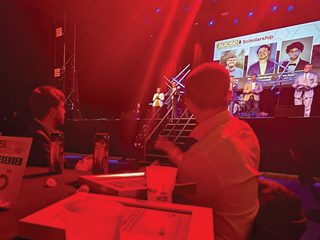
AMPP Leadership Programme
I am most grateful to have secured a place on this year’s EMERG AMPP leadership programme alongside 13 others. Our cohort was composed of engineers, managers, and researchers with diverse backgrounds, experiences, and perspectives, which made our group unique and dynamic as a leadership team. Our first in-person session in Denver gave me an appreciation for the breadth of perspectives across different industries and the similarities in the group’s challenges as leaders.
I especially enjoyed the emotional intelligence workshop delivered by Phil Reynolds. Phil’s session let me reflect on my previous role as Safety and Assurance Package Manager at Atkins on a large nuclear and defence project. For example, I learned how to capitalise on my current strengths and bolster my relationship management skills to foster a culture of collaboration and respect.
Since the conference, we have had two further sessions and started on our group project, “How we can build upon AMPP’s diversity.”
I am excited about strategising with my team and making a lasting impact on AMPP.

Conclusion
If you are just starting your career as a young engineer and are interested in corrosion, I highly recommend applying for the ICorr’s YEP. It was an eye-opening experience. I have learned from SMEs in the industry, made fantastic friends along the way, and gained new and exciting opportunities through the programme.
Additionally, the annual AMPP conference is incredibly valuable for knowledge transfer, networking, and potentially finding new clients or services for your company.
Congratulations again to all award recipients and presenters! Thanks once again to all involved in helping me succeed along the way. Here’s to more in 2024!
CAPTIONS:
ICorr Table at AMPP-EMERG prize winners event.
YEP 2022 Winning Team With Praveena Nanthakuma, (Centred with ICorr President).

Institute News
Introduction
To help combat the relentless threat of corrosion, the Institute of Corrosion (ICorr) commits to training and developing the younger generation of corrosion professionals and proudly presents the 2024 edition of the Young Engineer Programme (YEP). Following the resounding success of previous YEPs in London and Aberdeen, this year’s programme promises to be a transformative journey for twenty-five early-career professionals passionate about a career in corrosion.
Programme Overview
The ICorr YEP is a specialised training initiative tailored to empower engineers, scientists, and researchers embarking on their careers with a keen interest in corrosion. The programme is designed to deliver a robust technical competency framework consistent with ICorr’s aims and professional standards. Its primary objective is to prepare participants for a rewarding future in the corrosion science and engineering industries by imparting a broad spectrum of knowledge and hands-on experience.
Key Programme Components
The YEP spans from January to November 2024, offering a comprehensive curriculum covering crucial aspects of corrosion management:
• Fundamentals of Corrosion: Establish a strong foundation for understanding the corrosion phenomenon.
• Materials Selection and Integrity Management: Learn the art of selecting the right materials to combat corrosion effectively.
• Plant Chemistry: Explore the chemical treatment strategies within industrial settings.
• Welding: Gain insights into welding techniques to enhance corrosion resistance.
• Coatings and Linings: Discover the world of protective coatings and linings.
• Corrosion Under Insulation and Fire Protection: Address corrosion challenges in insulation and fire protection systems.
• Cathodic Protection: Master the principles of cathodic protection in corrosion prevention.
• Presentation Skills (Related to the Case Study): Hone communication skills in order to present findings effectively.
Real-Life Case Study
In May 2024, participants will be divided into teams, each assigned a mentor to guide them through a real-life corrosion problem. This practical experience will put their knowledge and skills to the test, enabling them to devise solutions. In November 2024, the teams will present their findings to a panel of judges and an audience comprising ICorr members. The winning team will earn an all-expenses-paid trip to the AMPP 2025 Conference in Nashville, USA, generously sponsored by bp.
Additionally, the winning team plus one exceptional delegate will receive the coveted AMPP leadership course opportunity, chosen by the Institute based on remarkable commitment and performance.
Meet the 2024 YEP Participants
Below is a list of the selected participants for the 2024 YEP:
| 1 |
Alvaro Gonzalez Fuentes |
Wood Thilsted |
| 2 |
Alyshia Keogh |
University of Manchester |
| 3 |
Amy Johnstone |
Kent PLC |
| 4 |
Ben Hudson |
Premtech |
| 5 |
Berenika Syrek-Gerstenkorn
|
Scottish Power |
| 6 |
Christina Igube |
C-Probe Systems |
| 7 |
Clayton Bevas |
Jacobs |
| 8 |
Ellie Lowe |
DNV |
| 9 |
Fatima Mehnoune |
Intertek CAPCIS |
| 10 |
Georgie Bond |
Johnson Matthey |
| 11 |
Joe Linkson |
Wood Thilsted |
| 12 |
Katie Atkins |
Johnson Matthey |
| 13 |
Kevin Lam |
bp |
| 14 |
Kishan Ramesh |
Plant Integrity Management |
| 15 |
Lukasz Ramowski |
Saipem |
| 16 |
Mohammed Muqueeth |
Plant Integrity Management |
| 17 |
Muhammad Haris |
Brunel University |
| 18 |
Noor Ghadarah |
Saipem |
| 19 |
Roberto Alcivar |
vHPM UK |
| 20 |
Rochelle Holness |
Genesis Energies |
| 21 |
Roisin Harris |
Ramboll |
| 22 |
Samuel Brown |
Wood PLC |
| 23 |
Tom Robinson |
Saith Ltd |
| 24 |
William Adu-Poku |
Altrad Babcock |
| 25 |
Yulia Sergeykina |
bp |
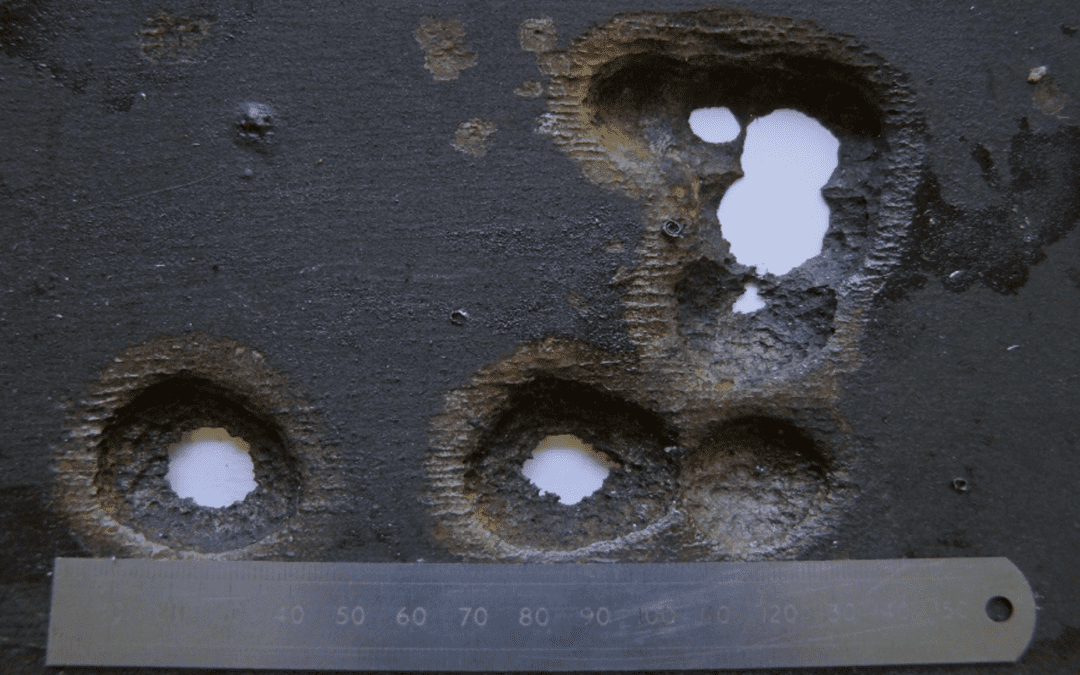
Institute News, Uncategorized
Our new Wales and South-West Regional Branch is set to host its first event and AGM on 21st March 2024. It’s first scheduled committee meeting will take place on the 1st of February 2024.
Covering a region with a hugely diverse range of business sectors, including:
- Aerospace
- Chemical plants
- Construction Products
- Energy Production
- Inspection and analytical services
- Oil & Gas
- Petrochemical
- Renewables
- Steel and metal manufacturing / recycling
This new ICorr Branch is being specifically founded to help this region develop and share knowledge regarding corrosion and corrosion prevention.
The Branch is ideally placed to join these diverse industries as well as leading Universities, for not only sharing this knowledge but also helping to develop new ideas for corrosion prevention.
A major key to the success of the Branch will not only be the promotion and sharing of knowledge, but also the development of corrosion and materials engineers of the future.
The initial aims of the Branch include:
- Having a focus on local industry needs and challenges within the broad subject of corrosion – with selected presentations from companies / academics etc.
- Promoting, sharing, and learning between experts within the region.
- Defining a yearly programme of meetings that generate discussions and promote learning across the region – guest visits / speakers / workshops / roadshows.
- Encouraging interest from undergraduates, schools, apprenticeship programmes, and colleges within the area on this broad subject.
- Committee meetings and social and technical events to be held across the Wales and South-West Region.
The first official event and inaugural AGM will be held on March 21st – 12pm – 2pm. Lunch will be provided. Committee members and their roles to be announced soon after the AGM.
Details of Event: The topic will be Microbiologically Induced Corrosion – Real world failures and how to prevent them. There will be two presentations, one by Sarah Bagnall, (Director of Consultancy Services at R-TECH) and one by Dr Gareth Williams, (Consultancy Services Manager of ECHA Microbiology). This will be followed by a Laboratory tour.
Location R-TECH Materials, Testing House, Kenfig Industrial Estate, Margam, Port Talbot, SA13 2PE.
Registration will close on Monday 18th March.
For further information on the Branch or if you are interested in attending this event, please contact: swchair@icorr.org
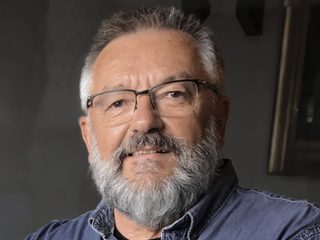
Institute News
On 20th December 2023, the Aberdeen ICorr Branch were guests of IMechE for a Joint Event at the Sandman Hotel in Aberdeen. This end of year Celebration that was very well attended with around 60 guests and was chaired by Steve Cromar CEng, FIMechE, IMechE Aberdeen Chair. The evening commenced with a welcome Hot Buffet Dinner, which was an excellent choice for a cold winter night.

Tom Baxter BSc (Hons), FIChemE.
Tom Baxter a Chemical Engineering Consultant and founding member of the Hydrogen Science Coalition spoke on ‘Future Energies and Greenhouse Gas Reduction’.
Tom graduated from Strathclyde University in 1975 with a B.Sc. in Chemical Engineering (first class honours) and is a Fellow of the IChemE. He started his career with ICI Petrochemicals, moved to fine chemicals with the Swiss company Ciba-Geigy, before taking a position as a process engineer in 1980 with BNOC (British National Oil Corporation). Through privatisation and acquisitions, BNOC became Britoil, then BP. Here he worked as an operations engineer, a development engineer, and research manager. In 1991 he left bp subsequently held positions with Altra Consultants as Technical Manager, as Technical Director with Genesis in 1998, and became the Aberdeen Business Unit Director in 2005. Since 2010 he became a Senior Fellow in the Chemical Engineering Department at Aberdeen University, which he helped establish, and since 2003, he has been a visiting professor of chemical engineering at Strathclyde University.
This coming decade is extremely important for achieving reductions, and individual impacts are great. During his most interesting talk, key themes discussed were ways to use less energy and an eye- opening debate on the misconceptions about renewable alternatives, (in terms of actual energy efficiency breakdown from production through to final distribution), which was considered in great detail. Overall, electrification came out as a very safe and efficient energy source.
Industrial Hydrogen Use
The Hydrogen (H2) does have some favourable characteristics, particularly buoyancy and no carbon monoxide, but has a low calorific value. Generally, hydrogen compares unfavourably overall with methane properties and has limited applications presently. For example, it requires three times the amount of compression power to move it along pipelines, and much talk of blending hydrogen was not seen as a good idea, although a 20% blend has been much promoted of late by others presenting to the Institute.
H2 is considered applicable for transport (although passenger car-dominated) and for some specialised industries, e.g., steel making. There have been recent question marks over some H2-driven projects. Pau (in France) cancelled its H2 buses, and the Redcar hydrogen project was recently cancelled.
Full-electric vehicles are seen as the most energy efficient for trains only for low train passenger routes in the UK (8oo kms out of 15000 kms) but there are lots of hydrogen miscellaneous uses. Batteries are the key to the future progression of renewables. Presently, the accurate hydrogen retail cost is not clearly defined.
Tom also spoke of https://www.h100fife.co.uk/ a parliamentary party group with interests including Cadent / Shell / others – Projected costs to 2050 however are not considered reliable.
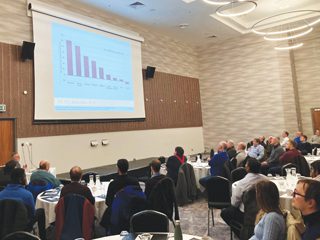
Tom Baxter (Seated) Chemical Engineering Consultant and Hydrogen Expert Presented.
Domestic Hydrogen Use
Vested interests, e.g., Catapult and EUA have recently promoted hydrogen for heating. Tom reviewed the outcomes of Hy4Heat. Its mission was to establish if it was technically possible, safe, and convenient to replace natural gas (methane) with hydrogen in residential and commercial buildings. Through a QRA study, they found that hydrogen was inherently less safe than methane, with three times as many potential events. Hydrogen usage requires more safety features and is 40% less energy efficient overall. Electric energy provides greater wattage.
Summary
Generally, with renewables, more government support is needed so as to give more headroom and the opportunity to recover capital costs over a longer period of time. Tom Baxter was extremely knowledgeable and provided a most interesting talk.
For more information refer www.h2sciencecoalition.com
Hydrogen Science Coalition | Bringing an evidence based viewpoint into the political discussion on hydrogen (h2sciencecoalition.com)
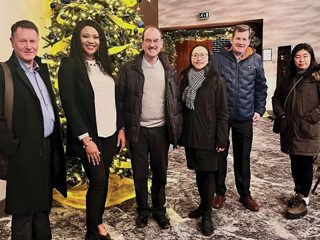
Members of the Aberdeen ICorr Committee, with New Member Stephanie Okoye Second from Left, with Guest Shukun Liu (Oceaneering) Far Right.



